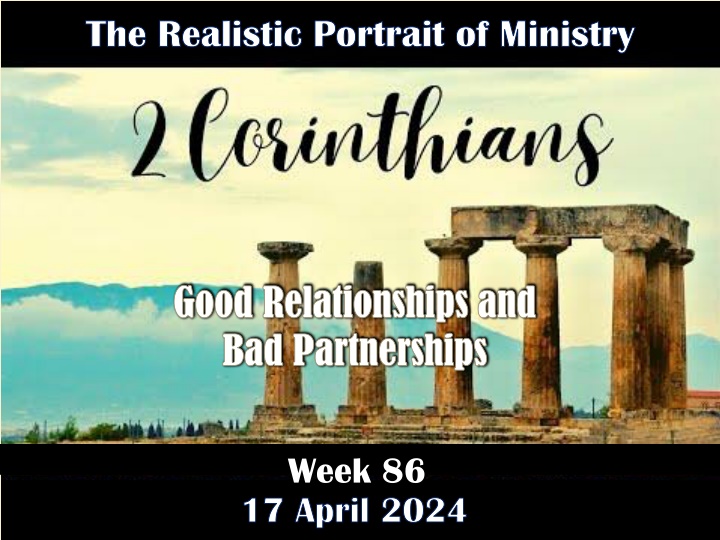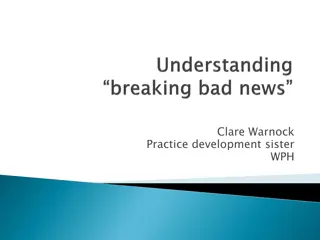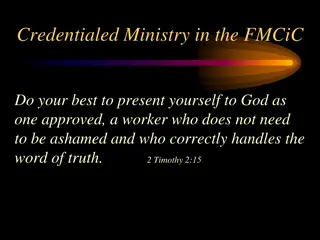The Realistic Portrait of Ministry: Good Relationships and Bad Partnerships
Exploring the themes of ministry, good relationships, and bad partnerships in the context of Second Corinthians. Paul emphasizes the importance of living distinctly as followers of Christ, maintaining spiritual purity, and navigating relationships with believers and unbelievers. The lesson underscores the significance of relationships in Christian living and the transformative power of seeking and cultivating healthy connections while being cautious of harmful influences.
Download Presentation

Please find below an Image/Link to download the presentation.
The content on the website is provided AS IS for your information and personal use only. It may not be sold, licensed, or shared on other websites without obtaining consent from the author.If you encounter any issues during the download, it is possible that the publisher has removed the file from their server.
You are allowed to download the files provided on this website for personal or commercial use, subject to the condition that they are used lawfully. All files are the property of their respective owners.
The content on the website is provided AS IS for your information and personal use only. It may not be sold, licensed, or shared on other websites without obtaining consent from the author.
E N D
Presentation Transcript
The Realistic Portrait of Ministry The Realistic Portrait of Ministry Good Relationships and Good Relationships and Bad Partnerships Bad Partnerships Week 86 17 April 2024
2 CORINTHIANS INTRODUCTION In our continuing study of Second Corinthians, the themes of this letter revolves around both the theological concepts and the practical aspects of Christian living. The primary issue at Corinth was the recognition of authentic ministry and submission to apostolic authority. Paul s corrective was to provide guidance and encouragement as the church navigates the challenges that continue to influence their unity, discipline, and spiritual growth. In our study, Paul emphasizes the importance of living distinctively as followers of Christ, maintaining spiritual purity, and remaining separate from the ways of the world. He stresses the importance of not being yoked together with unbelievers, highlights the believer's identity as the temple of the living God and calls believers to honor God in every aspect of their lives.
2 CORINTHIANS - LESSON OVERVIEW Swindoll . . . opens our study with what I consider a noteworthy expos on our connections to one another. He says . . . It doesn t take people long to realize that this world runs on relationships. Each person came into existence because of a relationship between a mother and a father. As we grow up, we have either good or poor relationships with our parents and family. Throughout our lives, we make, cultivate, ruin, start, and end relationships. We humans are relational beings. This should come as no surprise to Christians, because of the truth that God exists in a trinity. Of all the religions in the world, Christianity is the only one with a God who, in and of Himself, exists in eternal relationship with Himself: Father, SonandHoly Spirit.
2 CORINTHIANS - LESSON OVERVIEW As creatures uniquely created according to the image and likeness of God (Gen. 1:26-27), we naturally reflect the unity and distinction of the triune Godhead. We were created to live in relationship with God and with one another. God s Word, the Bible, is filled with accounts of relationships between people: people loving, fighting, praying, planning, laughing and singing. People grieving and sorrowing, people relating for good or bad. The Old Testament Law managed the Israelites relationship with God and with others. In fact, Jesus summed up the whole Law in terms of relationship: Love the Lord you God with all your heart, and with all your soul, and with all your mind . . . Love your neighbor as yourself (Matt. 22:37, 39).
2 CORINTHIANS - LESSON OVERVIEW Our lives are formed and transformed through a series of relationships. Yet, bad company can corrupt us (1Cor. 15:33), and good friends can strengthen us (Prov. 18:24). Close relationships with other believers must be sought, mended, and strengthened in order for the whole church to grow. At the same time, close relationships with unbelievers who have a completely different worldview and an opposite set of priorities then we do must be maintained with caution. Paul addresses both of these issues in our lesson good relationships and bad partnerships in 2 Corinthian 6:11-18.
2 CORINTHIANS 6:11-13 11O Corinthians! We have spoken openly to you, our heart is wide open. 12You are not restricted by us, but you are restricted by our own affections. 13Now in return for the same (I speak as to children), you also be open.
2 CORINTHIANS 6:11-13 In the opening of this letter, Paul reiterated his commitment to the Corinthian Christians, then he goes on to clear up some misunderstandings in their perception of him and his authority as an apostle. he had not followed through on his wish to visit them when he hoped. Some people were upset with Paul because they believed They had taken his intended itinerary as an ironclad promise, so when circumstances prevented him from keeping to his original plan, the Corinthians mistakenly took that for being fickle or undependable. It did not help that these charges were exaggerated by Paul s opponents in Corinth, the Judaizing Christians, trying to steer the church away from Paul s teaching.
2 CORINTHIANS 6:11-13 The Judaizer s themselves were trying to live with one foot in the new covenant and one foot in the old the church and the synagogue, Christianity and Judaism. This kind of syncretism demanded compromises in Christian doctrine and practice, compromises that destroyed the essence of the gospel of salvation by grace through faith. Between chapters 2 and 6, Paul deviates from his original discussion concerning his relationship with the Corinthians; and turns to a related, yet subordinate, issue: the makings of an effective ministry. Since ministry is about people; and evangelism and discipleship involves working with people.
2 CORINTHIANS 6:11-13 And since by definition, ministry means helping, serving, encouraging, exhorting, confronting, and relating to people. Paul s discussion of the ups and downs of authentic ministry provides an important framework for the value he placed on relationships with people in the churches he helped establish. In 6:11, Paul returns to his original train of thought and the purpose for this letter restoration of the relationship between himself and the Corinthian Christians. In this verse, Paul reminds the Corinthians of how freely he had given himself to them and how candid and honest he had been. Verse 11, literally says, Our heart is open wide.
2 CORINTHIANS 6:11-13 Both internally, in their feelings for them, as well as externally, through their words, Paul and his ministry partners feltandexpressed deep love and care for the Corinthians. The depths of Paul s emotions is revealed when he says in the midst of this letter O Corinthians. Here he blends his frustration and affection, he summons the Corinthians and calls for them to respond with unrestrained love. But the Corinthians did not respond in kind, not at the same level of intensity or the same outward manifestation. Instead, they were restrained in their affections (6:12). The word affections, literally means bowels the internal organs of the heart, liver, and lungs.
2 CORINTHIANS 6:11-13 In those days, it was believed that human emotions emanated from these organs, because when a person felt happy, sad, frightened, or courageous, the person would feel a physical sensation churning in that part of the body. So, the term bowels came to refer metaphorically to deep, sincere, heartfelt feelings. Consequently, Paul implies that his relationship with the Corinthians has been one- sided. In other word, Paul says he had spilled his guts to them but they had guarded their hearts with him. So, in 6:13, speaking as a loving father, longing for a tender relationship with his children Paul says Now in a like exchange I speak as to children open wide to us also.
2 CORINTHIANS 6:11-13 If you have ever tried to hug a child who did not want to be hugged? Or converse with a moody teenager who grunts single-syllable answers in return? You know, that it is impossible to establish or build a healthy relationship like that. In order for relationships to work, both parties have to freely share their feelings and open up in conversation. Yet the Corinthians had refused to make an emotional connection with the apostle.
2 CORINTHIANS 6:14-18 14Do not be unequally yoked together with unbelievers. For what fellowship has righteousness with lawlessness? And what communion has light with darkness? 15And what accord has Christ with Belial? Or what part has a believer with an unbeliever? 16And what agreement has the temple of God with idols? For youare the temple of the living God. As God has said: I will dwell in them And walk among them. I will be their God, And they shall be My people. 17Therefore Come out from among them And be separate, says the Lord. Do not touch what is unclean, And I will receive you. 18 I will be a Father to you, And you shall be My sons and daughters, Says the LORD Almighty.
2 CORINTHIANS 6:14-18 While the Corinthians had been reserved in their relationship with Paul, they had eagerly entered into intimate personal and professional relationships with unbelievers. They locked out the people who cared about them, who sacrificed and suffered for them, and locked arms with those who would potentially damage their walk with Christ. What a lack of discernment, Paul candidly confronts their error: Do not be bound together with unbelievers (6:14). The term bound together comes from the word for yoking animals together as they plow a field. Here, Paul is drawing from an Old Testament principle in Deuteronomy 22:10, You shall not plow with an ox and a donkey together.
2 CORINTHIANS 6:14-18 Oxen and donkeys pulled differently, so plowing a straight line would have been nearly impossible. Drawing a spiritual principle from this command, Paul argues that it is a mistake to connect a believer and an unbeliever together in a close relationship that requires pulling together in a unified direction. Whether marriage, business, or any other formal, long- term, contractual or covenant relationship. Why? Because believers and unbelievers have different goals, different worldviews, different methods, and different rules.
2 CORINTHIANS 6:14-18 The challenge is that many Christians take this verse to mean more than Paul intended, so they choose to associate only with other believers all the time. They shun secular schools and colleges, use only Christian businesses, employ only Christians, only go to Christian owned restaurants and maintain friendship only with Christians. However, 1 Corinthians 5:9-10, assures us that this extreme application is not what Paul actually had in mind: I wrote you in my letter not to associate with immoral people; I did not at all mean with the immoral people of this world, or with the covetous and swindlers, or with idolaters, for then you would have to go out of the world.
2 CORINTHIANS 6:14-18 If we refuse to associate with the lost, how will they ever come to know Christ? Paul s thoughts here in chapter 6, concerns permanent, day-to-day kinds of relationships, not casual friendships and social interaction. We can use the term consociate partnership to describe the kind of bound together relationship Paul has in mind. So, what kind of partnership is this? How close is too close? Where do we draw the line?
2 CORINTHIANS 6:14-18 To help us answer these question, in 6:14-16, Paul contrasts the completely opposite natures and conditions between Christians and non-Christians. Using these black-and-white examples:
2 CORINTHIANS 6:14-18 Look again at these verses: Do not be bound together with unbelievers: for what partnership, have righteousness and lawlessness, or what fellowship has light with darkness? Or what harmony has Christ with Belial, or what has a believer in common with an unbeliever? Or what agreement has the temple of God with idols? (6:14-16) Underscoring the words partnership, fellowship, harmony, common, andagreement. Together they describe close, intimate, interdependent, shared, and single-minded relationships that take time to develop and are difficult to end. Believers and unbelievers should never enter into these kind of relationships. Never!
2 CORINTHIANS 6:14-18 Why not? Because certain things are essentially distinct and fundamentally incompatible. Believers should not form relationships with unbelievers that would either lead to a compromise of their Christian standards or jeopardize the consistency of their Christian witness. What if you are already married to an unbeliever? Maybe you were not a Christian when you married or you ve learned more and you re taking your faith seriously. Maybe you entered into a marriage with a person you thought was a believer but who has since proven to be either an unbeliever or a very immature Christian unwilling to grow.
2 CORINTHIANS 6:14-18 You may have entered into your relationship without knowing that believers and unbelievers were not to walk that path of intimacy. Does that mean you should seek to be unhitched divorced? No! Although Paul warns us against entering into these relationships, once we are married, the principle of 1Corinthians 7:12-13 kicks in. Here, Paul says if your unsaved partner is willing to stay with you, you are to stay in the relationship and become a live-in witness for Christ. That will not be an easy calling.
2 CORINTHIANS 6:14-18 Like an ox and a donkey plowing together, conflict will inevitably arise and will add increased tension as you try to plow a straight path for Christ. It will not be easy, but neither should it be considered impossible. What if you have entered into a contractual or business partnership with an unbeliever? Should you get out of It? No! Paul says in Gal. 3:15, that our human covenants or contracts cannot simply be side aside or annulled. We must let our yes be yes and our no be no (Matt. 5:37). If we can be legally and ethically released from a contract, that s one thing; but following through on our obligations, even foolish ones is a Christian virtue not easily broken.
2 CORINTHIANS 6:14-18 Verses 16-18, highlights the underlying reason for the prohibition against being bound together with unbelievers. Here, Paul calls the corporate body of the church the temple of the living God. From the Old Testament, Paul emphasizes the intimate relationship God Himself has with His people: I will dwell in them . . . [I will] walk among them . . . I will welcome you . . . I will be a father to you . . . And you shall be sons and daughters to me (6:16-18). Because of this intimate relationship with the holy God, we should keep ourselves separate from unholy relationships.
2 CORINTHIANS 6:14-18 And, because God is in our midst, we should come out from their midst (6:17). Because God has cleansed us by His sanctifying presence, we should not touch what is unclean (6:17). Our relationship with God places us in an intimate, corporate relationship with other believers. This relationship involves spiritual harmony (6:16), personal purity (6:17), and familial intimacy (6:18). We are God s temple, and we should not bring into His temple anything or any relationship that dishonors Him or destroys the harmony, purity, andintimacy we are meant to experience in the body of Christ, the church.
APPLICATIONS OF THE LESSON Safe Guidelines for Relationships
APPLICATION SAFE GUIDELINES FOR RELATIONSHIPS Swindoll closes with a question: How can we stay on the straight and narrow path when it comes to relationships?" He then offers tworules of thumb that will help us decide how close to get to the people in our lives. The first is positive (6:11-13): It s an exhortation, that will strengthen our relationships with other in the church. The second is negative (6:14-16):It s a warning against being unequally yoked with unbelievers. FIRST RULE unless there is an emotional bond, we cannot experience authenticity in a relationship. All of us are called to closer, more intimate and interdependent relationships with our fellow believers.
APPLICATION SAFE GUIDELINES FOR RELATIONSHIPS Yet the kind of intimacy we are called to experience can t happen without wholehearted transparency. It means honesty. It means open communication. It means sharing from our hearts and caring through our actions. By contrast, Paul, had a lopsided relationship with the Corinthians. He flooded them with affection; they responded with dryness (6:11-13). He poured into them; they drained him out. He embraced them with unconditional love; they gave him a cold shoulder and a formal handshake. Are you in that kind of relationship? Which side of that uneven relationship are you on?
APPLICATION SAFE GUIDELINES FOR RELATIONSHIPS If you are cold to another s warmth whether in church, in your family, or your marriage that kind of relationship cannot continue without causing severe problems. Likewise, if you are pouring into a relationship and the other person is not reciprocating your affections, you may need to ask yourself whether it is an authentic relationship based on mutual love and trust, or a shallow substitute. In either case, pray for wisdom concerning how you can mend inequality and bring the relationship to a place of health and stability (Rom 12:18).
APPLICATION SAFE GUIDELINES FOR RELATIONSHIPS SECOND RULE unless there is spiritual equality, we dare not be bound in a partnership. Unless your spiritual values and goals strongly agree with those of a potential partner whether in marriage, business, or some other partnership getting involve in a deep and permanent relationship will be like yoking a donkey to an ox. You will always be out of step with each other. One will be doing the heavy pulling while dragging the other along. And you will never be able to plow in a straight line. If you have found yourself cozying up too close to an unbeliever in a friendship, romantic relationship, or business partnership, ask yourself a few questions.
APPLICATION SAFE GUIDELINES FOR RELATIONSHIPS Why am I drawn to this person? Have I compromised my biblical principles as a result of this relationship? How? Is this relationship affecting my current relationships with other believers? Before God and with His help, do I need to put the brakes on in this relationship before it gets too intimate or becomes permanent. God has designed us for close relationships, but His desire is for them to be healthy, wholesome, pure, supportive and balanced. When they become unhealthy, destructive or lopsided, it is time to address them head on.
APPLICATION SAFE GUIDELINES FOR RELATIONSHIPS Our relationships ultimately exist for God s glory either to shine as lights in a darkened world or to deepen intimacy in the church. Don t let the darkness dim your light, and don t let shallow relationships with other believers weaken the body of Christ.
NEXT CLASS 1 May 2024 Before next class, read the below chapters in Before next class, read the below chapters in the KJV and in one other versions of the Bible, the KJV and in one other versions of the Bible, i.e., NIV, NRSV, TLB, CEV, etc i.e., NIV, NRSV, TLB, CEV, etc Chapter 7:1 7 Reverence for God, Respect for Others, Relief from Distress






















